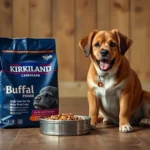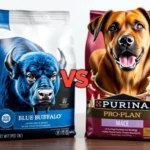
Introduction
Proper dog nutrition is crucial for maintaining your pet’s overall health and well-being. Just like humans, dogs require a balanced diet tailored to their specific needs, including age, breed, and health status. As pet owners, we often find ourselves curious about sharing human foods with our furry friends, particularly when it comes to treats and sweets. One question that frequently arises is, can dogs eat Smarties? This article delves into that query, exploring the nutritional needs of dogs, the characteristics of Smarties, and the potential risks involved in feeding these candies to your canine companion.
Understanding Dog Nutrition
The Basics of Dog Nutrition
To ensure your dog thrives, it’s important to understand the essential nutrients they require. Dogs need a balanced diet that includes:
- Proteins: Vital for growth, muscle development, and overall health. Sources include meat, fish, and legumes.
- Fats: Provide energy and support cell structure. Healthy fats can be found in fish oil and chicken fat.
- Carbohydrates: Offer energy and aid in digestion. Safe sources include brown rice and sweet potatoes.
- Vitamins and Minerals: Essential for metabolic processes, immune function, and bone health. A balanced dog food typically contains these nutrients.
A well-rounded diet is crucial for your dog’s health. Factors such as age, breed, and health conditions should guide your choices in dog food.
Common Foods and Their Nutritional Value
Not all human foods are safe for dogs. Here’s a brief overview of some common foods that are safe and those that pose risks:
| Safe Foods | Toxic Foods |
|---|---|
| Carrots | Chocolate |
| Apples (without seeds) | Grapes and raisins |
| Pumpkin | Onions and garlic |
| Peanut butter (unsweetened) | Avocado |
Understanding these distinctions helps you make informed decisions about your dog’s diet.
Smarties: An Overview
What Are Smarties?
Smarties are colorful, sugar-coated candies that are popular among children and adults alike. They are made primarily from sugar, corn syrup, and artificial colors, and they come in various flavors. Here’s a quick nutritional breakdown of Smarties:
- Sugar content: Approximately 80% of the candy is sugar.
- Artificial colors: These are used to create the bright, appealing appearance.
- Low nutritional value: Smarties offer minimal vitamins or minerals.
While they may be a fun treat for humans, the ingredients in Smarties raise concerns for canine consumption.
The Appeal of Smarties to Dogs
Dogs are naturally curious creatures, and they often find themselves attracted to brightly colored objects, including candy. The sweet scent and vibrant appearance of Smarties can entice dogs, making them more likely to snatch a few if they are within reach. However, the risks associated with feeding sugary foods to dogs should not be overlooked.
Can Dogs Eat Smarties?
Expert Opinions on Dogs and Candy
Veterinarians generally advise against feeding dogs any form of candy, including Smarties. The high sugar content can lead to various health issues, such as obesity, dental problems, and even diabetes. Additionally, the artificial colors and flavorings present in Smarties can cause gastrointestinal upset.
Symptoms of Sugar Overconsumption in Dogs
If a dog consumes Smarties or any sugary treats, it is important to monitor for signs of distress. Common symptoms of sugar overconsumption may include:
- Vomiting
- Diarrhea
- Excessive thirst
- Lethargy
- Hyperactivity
If you notice any of these symptoms following the consumption of Smarties, it’s important to take action promptly.
Recommended Actions for Dog Owners
If your dog accidentally consumes Smarties, here are some immediate steps to follow:
- Monitor Your Dog: Keep an eye on their behavior and look for any symptoms of distress.
- Check the Quantity: Determine how many Smarties were consumed and their size, as this can affect the severity of the situation.
- Contact a Veterinarian: If your dog displays any symptoms or if you are concerned, do not hesitate to reach out to a veterinarian for advice.
Taking these steps can help ensure your dog’s safety and well-being.
Healthy Alternatives to Smarties
Dog-Friendly Treats
While Smarties may not be suitable for dogs, there are plenty of dog-friendly treats that can satisfy their sweet cravings without the risks associated with candy. Some safe and nutritious alternatives include:
- Carrot sticks: Crunchy and sweet, carrots are low in calories and high in fiber.
- Apple slices: Remove the seeds and core, and your dog can enjoy this sweet, crunchy treat.
- Pumpkin puree: Plain, unsweetened pumpkin can be a delicious and healthy snack.
- Frozen banana slices: A cool treat for hot days that dogs often love.
Training with Healthy Snacks
Using treats as rewards during training sessions is a great way to reinforce positive behavior. However, it’s important to choose the right snacks and practice moderation. Here are some tips for using treats effectively:
- Choose Nutrient-Dense Treats: Opt for low-calorie, healthy snacks that won’t contribute to weight gain.
- Limit Portion Sizes: Treats should make up no more than 10% of your dog’s daily caloric intake.
- Use Treats Sparingly: Reserve high-value treats for special training moments to maintain their effectiveness.
By selecting healthy alternatives and using them wisely, you can keep your dog happy and engaged.
Conclusion
In conclusion, understanding dog nutrition is essential for ensuring your furry friend’s health and happiness. While it may be tempting to share candies like Smarties with our dogs, the risks far outweigh the rewards. Smarties contain high amounts of sugar and artificial ingredients that can lead to health issues. Instead, opt for safe, nutritious treats that your dog can enjoy without compromising their well-being. By prioritizing your dog’s health and choosing appropriate foods, you can keep them happy and healthy for years to come.
FAQs
Can dogs eat candy?
No, most candies are not suitable for dogs due to their high sugar content and artificial ingredients.
What should I do if my dog eats candy?
Monitor your dog for symptoms of distress and contact a veterinarian if you have concerns.
Are there any human foods that are safe for dogs?
Yes, many human foods, such as fruits and vegetables, can be safe for dogs when prepared properly.
Can dogs have sugar-free treats?
Some sugar-free foods contain xylitol, which is toxic to dogs. Always check ingredients before giving them to your pet.
What are some homemade treats I can make for my dog?
You can make simple treats using ingredients like pumpkin, peanut butter, and oats. There are many recipes available online for healthy dog treats.
By understanding what is safe and healthy for your dog, you can ensure they enjoy a balanced and nutritious diet while avoiding harmful foods.









